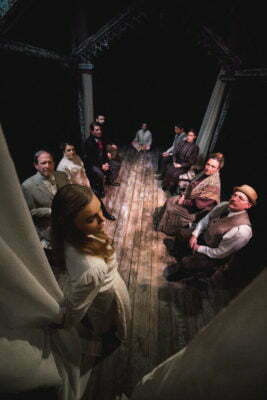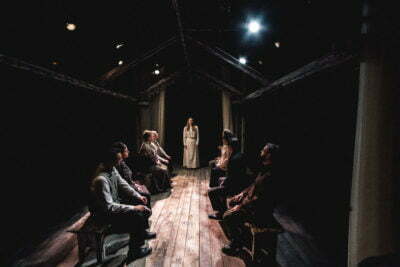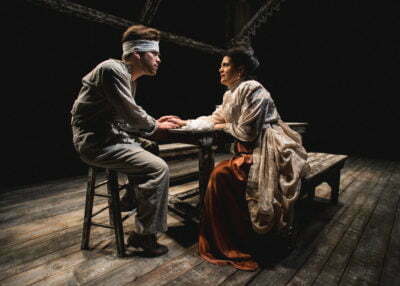The Seagull (Artistic Home)
 By Anton Chekhov
By Anton Chekhov
Translated by Christopher Hampton
Directed by Cody Estle
Produced by The Artistic Home, Chicago
A Strong, Conservative Seagull Takes Flight
As shown by the number of new adaptations of The Seagull that have played in Chicago recently, Anton Chekhov’s 1896 play, which he counterintuitively called a comedy, still maintains a strong grip on the minds of theatregoers. After all, pretty much anyone who spends much time around young artists has met several Konstantins and Ninas. Though the production at the Artistic Home directed by Cody Estle does not reimagine this very often-done work, it is blessed with Christopher Hampton’s translation, which preserves the nuances and ironies in the characters’ dialogue, and makes it easily understandable in contemporary terms. Besides, with Stupid Fucking Bird still fresh in the public mind, the familiarity of a straightforward Seagull may be just what audiences are hungering for, and it’s always somebody’s first exposure to Chekhov’s examination of intellectual neuroses and thwarted love.

The celebrated, aging veteran actress of melodramas Irina Arkadina (Kathy Scambiaterra) is spending her summer, as usual, at the estate she owns with her brother, the aging and enfeebled solicitor Pyotr Sorin (Larry Baldacci), but which is managed by a local family. With them is Irinia’s son, Konstantin (Julian Hester), a young man dependent on his mother andwho desperately wants to become an influential artist in his own right. He thinks the way to do so is by revolutionizing theatre in order to save it from the complacent rut Irina’s commercialism has led it into. Their relationship is complicated; mother and son greet each other by reciting the bedroom scene between Hamlet and Gertrude. On this night, Konstantin has invited the family and some friends to watch his girlfriend, Nina (Brookelyn Hébert), perform in a very avant-garde play he has written in order to demonstrate a new form of presentation which relies more on images and sound than narrative or character. It is not well-received.
 While Konstantin, who already had an extremely low sense of self-worth, becomes even more distraught, Nina is fascinated by Irina’s boyfriend, the famous writer, Trigorin (Scot West). Konstantin, jealous and confused, shoots a seagull to make some kind of point to Nina, which she interprets as a threat. Taking seriously the older artists’ polite compliments on her acting, Nina allows herself to be seduced by Trigorin, vindicating Irina and Konstantin’s insecurities, and prompting a (probably deliberately) botched suicide attempt, and the family’s sudden departure. Meanwhile, Masha (Laura Lapidus), the daughter of the estate manager, despairs of ever winning Konstantin’s love for herself, and the other hangers-on express their pity in a detached sort of way. A few years later, these petty squabbles have devastated several peoples’ lives.
While Konstantin, who already had an extremely low sense of self-worth, becomes even more distraught, Nina is fascinated by Irina’s boyfriend, the famous writer, Trigorin (Scot West). Konstantin, jealous and confused, shoots a seagull to make some kind of point to Nina, which she interprets as a threat. Taking seriously the older artists’ polite compliments on her acting, Nina allows herself to be seduced by Trigorin, vindicating Irina and Konstantin’s insecurities, and prompting a (probably deliberately) botched suicide attempt, and the family’s sudden departure. Meanwhile, Masha (Laura Lapidus), the daughter of the estate manager, despairs of ever winning Konstantin’s love for herself, and the other hangers-on express their pity in a detached sort of way. A few years later, these petty squabbles have devastated several peoples’ lives.

Julian Hester masters a very difficult part. While the butt of a lot of the play’s satire and a poor decision-maker, Konstantin has to be sympathetic, not just pathetic. He gets some help with that from Scambiaterra, who plays Irina with imperiousness that is a transparent mask for her anxiety over her age, but also with a self-centeredness that comes to the character naturally. Konstantin’s not alone in being set on edge by her, but he actually seems to like her more than most other people do. Hester speaks softly, but with conviction, when Konstantin is making his carefully-reasoned arguments and complaints: there really is a noble mind in there to be overthrown. He also finds excuses to cuddle with his uncle and responds with such overwhelming gratitude to praise from Doctor Dorn (Brian McKnight) that it’s clear that he’s starved for affection, at least, from people whose approval he cares about.

Hébert and West are also quite good as the naïve Nina and predatory Trigorin. The biggest problem with the production is that they’re just not good with each other. One of the most crucial scenes is a long conversation between them in which not only is there no chemistry, but Trigorin hardly even looks at Nina. Judging by the way West mostly addresses corners of the room, Estle has staged the scene as though Trigorin is baring his soul to Nina just because she’s willing to listen, by confessing he is unable to stand reading his own work because he feels so inadequate. However, later in the play, Konstantin receives physical proof that not only does Trigorin read his own stories, he didn’t even read Konstantin’s before blasting it during family game-night to make himself look superior. According to the text, Trigorin is a cynical manipulator who fakes vulnerability to seduce Nina and tears down Konstantin for entirely personal reasons, but that’s missing from West’s performance. Consequently, Konstantin and Irina are also missing a key driving factor in their extreme behavior, and their actors have to find other justifications. Nina’s self-destruction doesn’t risk straining credibility because it mostly happens off-stage.
Still, despite sagging in the middle, Estle’s Seagull starts and finishes very well. He cleverly was able to fit the entire play onto Artistic Home’s set, which scenic designer Jeffrey Kmiec built out of old wood with chipped paint to supply the feel of the proud, but struggling, estate. Estle also captured the right tone for Chekhov. The humor provided by the secondary characters is as dry as can be, particularly Lapidus’s sardonic performance, and that of Kaiser Ahmed as Medvedenko, the local teacher and punching bag. Hébert’s performance in Konstantin’s play is a study in good bad acting. But the funny moments don’t detract from the power of the ending; once Konstantin starts tearing up his manuscripts, the sense of dread that has been building all night reaches a devastating climax. The Seagull is such a strong script that a production doesn’t have to be perfect to be worth seeing for old fans and new ones. Even with my quibbles, this one’s sophisticated tone, design, and performances make it a moving experience.
Recommended
Jacob Davis
This show has been Jeff recommended.
For more information, see The Seagull’s page on Theatre in Chicago.
Playing at The Artistic Home, 1376 W Grand Ave, Chicago. Suggested donation is $28-32; to order, call 866-811-4111 or visit theartistichome.org. Performances are Thursdays at 7:30 pm, Fridays and Saturdays at 8:00 pm, and Sunday at 7:00 pm through July 3. Running time is two and a half hours with one intermission.

